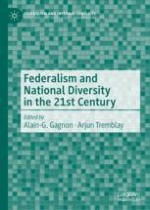2020 | OriginalPaper | Buchkapitel
11. Internal Migration, Ethnic Federalism and Differentiated Citizenship in an African Federation: The Case of Ethiopia
verfasst von : Yonatan T. Fessha, Beza Dessalegn
Erschienen in: Federalism and National Diversity in the 21st Century
Aktivieren Sie unsere intelligente Suche, um passende Fachinhalte oder Patente zu finden.
Wählen Sie Textabschnitte aus um mit Künstlicher Intelligenz passenden Patente zu finden. powered by
Markieren Sie Textabschnitte, um KI-gestützt weitere passende Inhalte zu finden. powered by
